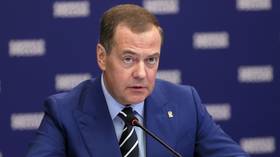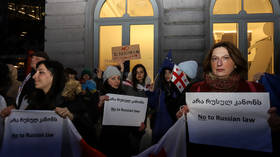NGOs are weapons in ‘hybrid war’ – ex-Russian president

Russia’s adversaries have been using various non-governmental organizations (NGOs) to destabilize the nation, former Russian president Dmitry Medvedev stated on Friday while stressing the need to counter such destructive activities.
Speaking at a session of Russia’s Ministry of Justice, Medvedev, who now serves as deputy chairman of the Security Council, claimed that NGOs were frequently being used for malign purposes.
“We know that the favorite method of our enemies, of all sorts, is to use NGOs in hybrid wars,” the official asserted, noting that some organizations that “had been created under a decent plate actually seek to stir up the situation in the country and undermine stability in civil society.”
Examples to such attempts are numerous, he added.
With this in mind, Medvedev called for honing the relevant legislation in a way that would curb the activities of malign NGOs while empowering those which seek to do good.
“On the one hand, it is necessary to create comfortable conditions for normal, bona fide NGOs, whose work brings real benefits to the state and society,” he said. “On the other hand, it is necessary to severely suppress the work of structures whose activities run counter to Russia’s interests.”
To achieve this goal, Medvedev continued, Russian authorities “should not hesitate to use all necessary legal instruments.”
At the same time, the ex-president continued, Moscow would resist efforts by various nations to undermine the pillars of international law. He stated that Russia would continue to advocate for “the consistent formation of a multipolar world order” while making its best efforts to “prevent the distortion” of norms of international law and the revision of the UN Charter.
“Of course, [Russia would continue] to insist that the practice of interference in the internal affairs of states should be abandoned,” Medvedev added.
Last summer, Russia adopted a new law on foreign agents, which entered into force last December. The legislation, which seeks “to protect the interests and security” of Russia, introduced more regulation on persons and entities that are being influenced by a foreign power in one way or another. The new restrictions prohibit them from performing a wide range of educational activities or serving as public officials.













